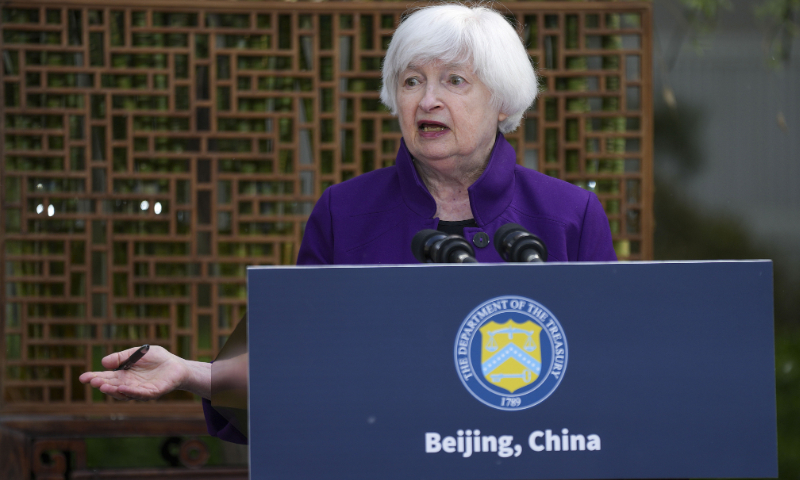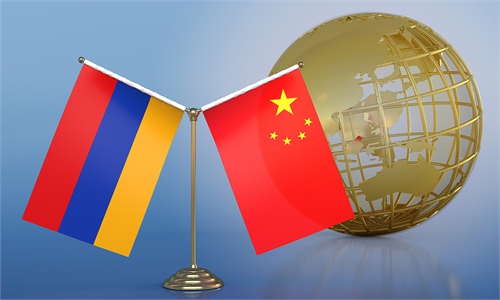
US Treasury Secretary Janet Yellen speaks during a press conference in Beijing, China, on April 8, 2024. Photo: VCG
When US Treasury Secretary Janet Yellen visited China, her attire, the restaurants she went to and the dishes she ordered all sparked discussion on Chinese social media. This demonstrates the importance Chinese society attaches to the US and their expectations for improvement in China-US relations.
Yellen did seem to have come in the hope of asking China for something. During her visit, she requested that China control the production capacity of electric vehicles (EVs) and solar panels, with a particular emphasis on preventing low-cost exports of these products. This is essentially asking for China to engage in non-market administrative intervention. Isn't she basically asking a favor from the Chinese government for this?
However, the expansion of production capacity in China and the decrease in prices are the results of fierce market competition among manufacturers. Although this competition sometimes has negative effects, it is the essence of a market economy, with more positive effects. It allows consumers to access more affordable products, and the overall cost of promoting new energy is reduced, which undoubtedly aligns with the overall direction of human progress.
The US and Europe cannot produce cheap new energy products like China, which is their limitation and problem. They want to use tariffs and non-tariff barriers that violate WTO rules to block the sale of Chinese products in the world, but it may be in vain.
Firstly, the global demand for EVs and solar panels will continue to grow. Although many countries lag behind China in terms of EVs and the relevant supply equipment, and the proportion of solar power generation is not high, the overall goal of the UN Climate Action and the progress of carbon emission targets are clear. While EVs still need electricity to operate, centralizing power generation to address carbon emissions is much more efficient than addressing the emissions of each car individually, and the cleanliness of power generation is rapidly improving. Therefore, the electrification of cars is inevitable, and developed countries in particular will find it difficult to avoid the trend.
Secondly, Chinese-made electric cars are cheap and of good quality, making them an irresistible temptation in the market. Recently, the US and its major allies raised "security concerns" about 5G equipment. Some European countries' network operators have requested the government to provide subsidies for not purchasing Chinese 5G equipment and instead buying higher-priced, lower-quality equipment such as Nokia. As the government is unwilling to provide subsidies, they were forced to agree to the network operators purchasing Chinese-made 5G equipment. In developing countries, the situation is even more pronounced - whoever offers the cheapest and best-quality products will be chosen, and the US cannot block the sale of Chinese-made 5G equipment.
The situation is similar with EVs. Except for the small number of people who are obsessed with European and American brands, ordinary people who want to buy commuting tools have strong demand for Chinese EVs, which offer good quality and affordable prices. Dealers are also willing to do business with Chinese EV companies. Even if the US raises tariffs, it cannot stop the purchasing demand of other countries.
I believe Yellen is clear about this situation, and she hopes that the Chinese government will "control" Chinese companies. She has to "ask a favor from" China. However, since most of the production of EVs and battery panels are private enterprises, their behavior is highly market-oriented, and the Chinese government may be unable to help.
In the early stages of EV development, there may have been some "chaotic competition," but the problem of overcapacity will be managed through market-oriented means, and production capacity that lacks competitiveness will be naturally eliminated.
Of course, I don't think that Yellen's "request" is completely unworthy of attention. Giving other countries' manufacturers some development opportunities and leaving room for other countries to grow are in line with China's strategic interests.
The development of EVs requires more charging pile supporting facilities, which highlights the issue of infrastructure construction and the need for strong promotion. Objectively speaking, Chinese manufacturers still lack the ability to lead independently. It would be beneficial for the strategic development of the Chinese electric vehicle industry to have companies like Tesla from the US "keep pace" and compete with Chinese manufacturers while working together to promote the formation of a stronger trend in the use of EVs.
Japan is a country with very active development of new technologies, but not all of Japan's individual technological revolutions have been promoted globally. One of the major reasons is that the US does not follow Japan's technology, and Japan alone cannot lead the global consumption direction.
Yellen stated in China that the US-China relationship can only move forward with direct and open communication, which I think are frank words. Yellen also reiterated that the US does not seek to decouple from China. In the field of new energy and many consumer goods, the US cannot decouple from China, and the two countries are destined to compete and cooperate with each other. A few people in America's political elites hope to "cut off" China-US trade, but that is just wishful thinking.
The author is a Chinese media professional. opinion@globaltimes.com.cn


